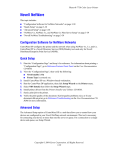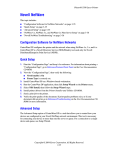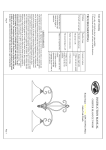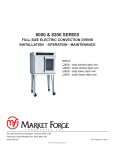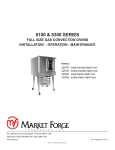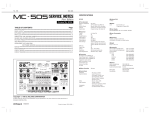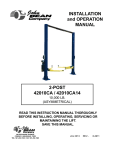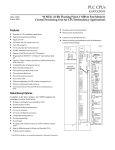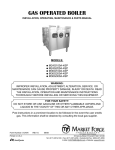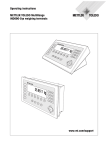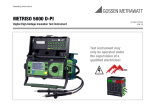Download Service Manual - Market Forge Industries
Transcript
st-24m series 12 pan pressureless steam cookers parts and service manual Effective august 13, 2014 Superseding All Previous Parts Lists. The Company reserves the right to make substitution in the event that items specified are not available. ERRORS: Descriptive and/or typographic errors are subject to correction. MARKET FORGE INDUSTRIES 44 Lakeside Avenue, Burlington, Vermont 05401 USA Telephone: (802) 658-6600 Fax: (802) 860-3732 www.mfii.com P/N 14-0290 Rev A (8/14) Table of Contents Principles of Operation. . . . . . . . . . . . . . . . . . . . . . . . . . . . . . . . . . . . . . . . . . . . . . . . . . . . . . . . . . . 3 Troubleshooting.. . . . . . . . . . . . . . . . . . . . . . . . . . . . . . . . . . . . . . . . . . . . . . . . . . . . . . . . . . . . . . . . . . 5 wiring diagrams. . . . . . . . . . . . . . . . . . . . . . . . . . . . . . . . . . . . . . . . . . . . . . . . . . . . . . . . . . . . . . . . . . . . 9 repair and replacement. . . . . . . . . . . . . . . . . . . . . . . . . . . . . . . . . . . . . . . . . . . . . . . . . . . . . . . . . 12 illustrated part list control panel assembly. . . . . . . . . . . . . . . . . . . . . . . . . . . . . . . . . . . . . . . . . . . . . . . . . . . . . . . . . 13 cabinet assembly. . . . . . . . . . . . . . . . . . . . . . . . . . . . . . . . . . . . . . . . . . . . . . . . . . . . . . . . . . . . . . . . . 14 door assembly. . . . . . . . . . . . . . . . . . . . . . . . . . . . . . . . . . . . . . . . . . . . . . . . . . . . . . . . . . . . . . . . . . . . 16 door latch and handle. . . . . . . . . . . . . . . . . . . . . . . . . . . . . . . . . . . . . . . . . . . . . . . . . . . . . . . . . . 17 condenser assembly. . . . . . . . . . . . . . . . . . . . . . . . . . . . . . . . . . . . . . . . . . . . . . . . . . . . . . . . . . . . . 18 august 13, 2014 2st-24m series convection steamers Principles of Operation GENERAL The ST-24 Pressureless Steam Cooker consists of two identical cooking compartments, one above the other, in a single cabinet assembly. Each compartment is fitted with independent electrically controlled steam circuits and spring-loaded, self-sealing doors with slam action latches. Compartments can be used separately or simultaneously for either constant steam or 60-minute timing. The principles of operation in this section include an explanation of steam, steam condensing, and electrical circuits and their functioning. PLUMBING CIRCUITS The plumbing circuits consist of the piping, steam solenoid valves, orifice, drain, and cold water condenser required to provide controlled steam application to the cooking compartments. A simplified diagram of these circuits is shown in below NOTE: Figure 1 is strictly a pictorial schematic diagram and is not intended to show the actual configuration of the plumbing. All components are shown in correct relationship with each other. However, the diagram does not show their actual locations or position within the cooker. As shown in the diagram, steam inlet and exhaust connections are connected at the factory directly into a steam boiler or direct-connected steam plumbing enclosed within the base cabinet on which the cooker is mounted. The boiler (or direct-connected steam control system) is equipped to supply constant, regulated steam at 14–15 PSI. Steam exhaust, having been reduced to water by the cold water condenser, is directed into the boiler (or directconnected steam control) drain system. Steam inlet lines for compartments are equipped with normally closed solenoid valves operated by the electrical control circuits. The inlet valves are opened whenever the compartment control circuit is activated by use of the 60-minute timers. Steam Inlet Line A steam supply line is plumbed from the boiler output (or direct-connected steam control) to a 1/2-inch barb fitting connected to the input sides of both steam inlet solenoid valves. When a cooking compartment is not in use, the valve for the compartment remains closed to prevent steam from entering. During operation, the appropriate inlet solenoid valve is opened by activation of the control circuit. Steam is projected onto the surface of pans of food loaded into the compartment by an orifice located inside the compartment. Steam continues to flow through the compartment in this manner until the control circuit closes the solenoid valve. Figure 1 august 13, 2014 3st-24m series convection steamers Principles of Operation Steam Exhaust and Drain Lines Perforated strainers at the drain line openings inside each compartment allow only steam, condensation, and liquid cooking drainage to enter. Prior to discharge into the boiler drain system, steam is converted to water by the cold water condensing systems for each compartment. Steam Exhaust Condensing System The steam condensing system consists of the identical, two-position, normally closed cold water solenoid valves, with outlet sides connected into the exhaust plumbing for each cooking compartment. A spray nozzle directs cold water about the inside of the drain lines to increase cold water contact with exhausted steam. Valve inlet sides are connected remote from the supply line of the steam boiler (or direct-connected steam plumbing). The valves respond to a thermostatic switch located inside the compartment. When the timer starts the cold water solenoids will energize. ELECTRICAL CIRCUITS The electrical circuits of the cooker control the power to activate timer motors and energize solenoid-operated valves and circuits, which in turn control application of steam to the cooking compartment and condensation of steam from the exhaust line. The cooker operates on 120V, 2 amp, 60Hz electrical service connected to all circuits from the circuits of the steam boiler (or direct-connected steam controls) contained within the cabinet on which the cooker is mounted. Power is supplied to the control circuit at all times when the shut-off device (Circuit Breaker) for the unit (installed by a certified Electrician) is in the ON position. Control Circuit Components A brief description of the electrical circuit elements follows. 60 Minute Timer/Constant Steam The timer contains a 120-volt AC synchronous motor that drives a timing dial through a gear reduction and clutch mechanism. The timer dial is manually set for any interval of operation from 0 to 60 minutes or constant steam as read on the calibrated dial face. The manual rotation of the dial moves the common element (1) of the timer switch from the neutral (OFF) position to contact (3), which connects with the steam inlet solenoid valve operating circuit. The cooker is placed into automatic operation with the setting of the timer dial. Its timing cycle, however, is automatically delayed by a thermostatic switch, which assures operating temperature is achieved before the timer motor begins to “time out.” When the timer motor has operated for the preset duration, the common element is transferred to contact (4), returning the inlet solenoid valve to august 13, 2014 the closed position and energizing the buzzer. Contact to the buzzer circuit remains closed until the dial is manually turned to the OFF position, returning the common element (1) of the timer switch to the neutral position. Indicator Lights An indicator light is included for both compartments. The light remains on (red) at all times when the coinciding timer dial is set and the door interlock switch is closed. The light turns off at the end of the timed cooking duration or when the set time has elapsed. Buzzer The buzzer is an alarm device that operates by oscillation of a striker against the core of an electromagnet. When the 60-minute timer dials reach the “0-Minute” position, the buzzer coil is energized to sound the buzzer. Movement of the timer dial to the OFF position opens the contact to the buzzer coil to shut it off. Door Interlock Switch The interlock switch is a single-pole proximity switch with normally open contacts. The switch is operated by the proximity of a magnet within the door. When the door is open, the switch contacts remain in the open position. When the door is closed and securely latched in place, the magnet is near the switch to close the contacts. Connected between the operating contact (3) of the timers and the steam inlet solenoid valve, the door switch acts as a protective device to interrupt valve operation unless the door is closed. Thermostatic Switch The thermostatically operated switch is a two-position, normally open switch mounted on the cooking compartment. The switch functions to activate the cold water solenoid valves of the steam condensing system and to delay timer motor operation until the compartment temperature reaches 195°F, thus assuring that cooking temperature exists throughout the timed duration. Digital Timers (Optional) The timer controls the steam to the cavity by either a constant steam setting or a used defined timer that will be programmed by the user into the timer Kettle Switch (Optional) The Kettle Switch will allow the user to set the mode of the steam. The user can either set the switch so that top and bottom cavity are in use at the same time. Or the bottom cavity and a separate direct connected kettle can be used at the same time. 4st-24m series convection steamers Troubleshooting Trouble-Shooting Guide The electrical trouble-shooting procedures that follow require access to components and terminals of the electrical control panel. Electrical controls are reached by removing screws that fasten the control panel to the frame. The panel may be pulled forward for testing while interconnected to the cooker circuits or disconnected at the pin connection for complete removal and repair. A trouble-shooting guide for use by service personnel is given in the table below. Electrical Fault Isolation Correction of an electrical failure first requires isolation of the fault to a single circuit or component. In most cases, the nature of the failure and its effect upon the operation of the cooker will be sufficient to narrow it down to one or more circuit elements. The Electrical Fault Isolation table is provided as a guide for isolating electrical faults. Incoming Power Before trouble-shooting any of the electrical parts or assemblies, verify that power is being supplied to the cooker. Incoming power is connected at the boiler (or directconnected steam) control box located in the base cabinet. With power connected to the cooker, an AC voltmeter is used to measure 120 volts across L1 and L2. If 120 volts is present, and the cooker will not operate, the fault lies within the electrical circuits of the cooker. Electrical Trouble-Shooting Procedures Before performing the trouble-shooting procedures in this section, the serviceman must be familiar with the function of all controls as described in the Operation section as well as with the Principles of Operation. ELECTRICAL FAULT ISOLATION GUIDE FAILURE FAULT LOCATION 1. Will not operate in either CONSTANT STEAM or 60-MINUTE TIMER positions. 2. Operating in CONSTANT STEAM position but not in 60-MINUTE TIMER position. 3. Operates in 60-MINUTE TIMER position but not in CONSTANT STEAM position. 4. Steam solenoid valve fails to open with indicator light on. 5. Indicator light off when steam solenoid valve open. 6. With indicator light on and steam solenoid valve open, timer dial fails to turn. 7. Buzzer fails to sound at end of 60-MINUTE TIMER mode. 8. Steam flows continuously from boiler drain line. august 13, 2014 a. b. c. d. a. b. a. b. a. b. a. b. a. b. c. d. a. b. c. a. b. c. Incoming power Timer Door interlock switch Wiring 60-minute timer Wiring Timer Wiring Solenoid valve coil Wiring Indicator light Wiring Compartment thermostatic switch Constant steam position Timer motor Wiring 60-Minute timer contacts Buzzer Wiring Thermostatic switch Cold water solenoid valve Wiring 5st-24m series convection steamers troubleshooting Electrical Inspection To confirm timer motor condition, proceed as follows: The first step in any electrical trouble-shooting procedure is a thorough physical inspection of all wiring connections. To access electrical components, remove the control panel as explained in Exterior Panel Removal. 1. Carefully check motor wire leads and tighten loose connections. warning Before removing control panel or checking connections and wiring, be sure that the circuit breaker for incoming power is OFF. When power is supplied, all exposed terminals of the control panel carry 120 volts. Check all wiring connections by hand to assure that both ends of all connection points are tightly secured. Use a screwdriver to tighten connection points. If necessary, visually inspect all quick-disconnect terminals for evidence of corrosion. Terminals in this condition should be separated, cleaned with emery cloth until shiny, and tightly reconnected. 60 Minute Timer Timer Contacts Defective timer contacts will result in failure of either cooker compartment to operate. When this occurs, remove the control panel (see Exterior Panel Removal), and proceed as follows: warning Use care while working with control panel. Terminals carry 120 volts. 2. Turn on power to the cooker. 3. Set timer dial (any setting beyond “0-Minute”). If operation is correct, the motor will turn the dial toward “0-Minute.” If the motor fails to operate, it is defective and the entire timer must be replaced. 4. Shut off power to the cooker. Door Interlock Switch Malfunction of the cooker door interlock switch prevents timer indicator lights from turning on and steam solenoid from opening when the timer dial is set. If steam does not enter the compartment and the indicator light fails to turn on with the door latch securely engaged, the fault may be in the door interlock switch. Proceed as follows: 1. Turn off power to the cooker. 2. Disconnect wires to the door switch terminals. 1. Turn off power to the cooker at external circuit breaker. 3. Connect an ohmmeter between the terminals of the switch. 2. Disconnect all five wires from timer terminals 4. Actuate the switch by closing the cooking compartment door. If a zero reading cannot be obtained, the switch is defective and must be replaced. 3. Connect an ohmmeter between terminals 1 and 3. 4. Rotate timer dial beyond the “0-Minute” point (any setting) to obtain a reading of zero ohms on the ohmmeter. If zero ohm reading cannot be obtained, timer contacts are defective and the timer must be replaced. 5. Move ohmmeter leads to terminals 1 and 4. 6. Rotate timer dial to “0-Minute” position (an audible click indicates correct position). If zero ohm reading cannot be obtained, the timer is defective and must be replaced. 7. Remove ohmmeter and replace all five leads on timer terminals. 5. Remove the ohmmeter and replace the leads on switch terminals. Steam Solenoid Valves When either inlet solenoid valve fails to operate, the fault may be a defective coil. A defective coil is found using an AC volt-meter to check the voltage at the coil wire terminals, with the cooker compartment operating in either CONSTANT STEAM or 60-MINUTE TIMER mode. If voltage of 120 volts is present and the coil fails to open the valves, the fault is in the valve coil. Defective valve coils are not separately replaceable, requiring complete valve replacement. Timer Motor A defective timer motor will cause continuous operation in the TIME mode, with the timer dial failing to return to the “0-Minute” position. Since thermostatic switch failure can cause the same symptom, fault must first be isolated to the timer by testing the thermostat. august 13, 2014 6st-24m series convection steamers troubleshooting Indicator Lights Cold Water Condenser Circuit If the cooker compartment functions correctly, with the single exception that the indicator light fails to light during operation, the fault is a defective indicator light. A “burned out” or defective light is verified by using an AC volt-meter at the leads, with input power on the selector switch in the correct position for that timer, the timer set, and the door latches closed. If 120 volts is present, the fault is in the indicator light and requires replacement. If 120 volts is not present, the fault is in the wiring or control components (selector switch, timer, or door switch). If during cooker operation steam exits from the drain line opening (located in lower boiler compartment) and the condensing system fails to operate, as evidenced by repeated discharge of water from the drain line, the condensing circuit is malfunctioning. The failure can be caused by a defective condenser thermostat or cold water solenoid coil, or by wiring failure. To test condenser thermostat, refer to Cooking Compartment Thermostatic Switch. Cooking Compartment Thermostatic Switch A thermostatic switch included in the circuit for the timer motor delays timer operation until steam flowing into the compartment satisfies the temperature-actuated switch device. If a timer motor fails to operate within about one minute after the indicator light comes on (with cooker compartment empty), the cause may be a defective thermostatic switch. To test the switch, proceed as follows: 1. Disconnect the two wires connected to the thermostatic switch terminals. 2. Connect an ohmmeter between the two terminals of the switch. 3. Place the cooker into operation and observe ohmmeter dial. Within one minute of operation, the switch contacts close automatically to register a zero ohm reading on the dial. If a zero ohm reading is not obtained, the switch is defective. 4. Shut off cooker, disconnect ohmmeter leads, and replace wires on switch terminals. Buzzer If the buzzer does not sound at the termination of the operator-selected timer setting (timer dial returned to “0-Minute” position), the fault may be a defective buzzer. Buzzer operation is verified using an AC volt-meter at buzzer coil connections with input power on and selector switch and coinciding timer dial set at the “0-Minute” position. If voltage is 120 volts, the fault is in the buzzer, which must be replaced. If 120 volts is not present, the fault is in the wiring or control components (timer or selector switch). august 13, 2014 If the condenser thermostat functions correctly, but either of the cold water solenoid valves fails to operate, the cause might be a faulty valve coil. A defective coil is found using an AC volt-meter to check the voltage at the coil wire terminals with the cooker compartment in operation. If voltage of 120 volts is present and the valve fails to open, the fault is in the valve coil. Defective valve coils are separately replaceable. Wiring All of the electrical components of the cooker (timers, indicator lights, etc.) are connected to each other by wiring. If all of the electrical components are operating correctly (and the incoming power has been checked), but the cooker fails to operate, the fault lies in the wiring. The Wiring Diagrams in this manual show all terminals and interconnections within the electrical circuits. All numbered terminals are identified and all leads number coded as shown. Connections can be easily removed. The Schematics show the same information schematically and is an aid in isolating circuits for testing. Using an ohmmeter, wiring continuity between the connections shown on the wiring diagram is readily verified. This is best done in stages, removing only those wires required for each continuity check. As each lead is replaced, it should be checked for evidence of corrosion, and cleaned if necessary. All leads must be tightly attached so as to provide a good electrical connection. 7st-24m series convection steamers troubleshooting GENERAL TROUBLESHOOTING GUIDE PROBLEM PROBABLE CAUSE(S) 1. Indicator light fails to light with timer a. Power to cooker off. set. a. b. Door interlock switch contacts b. not closed. c. Door interlock switch faulty. c. d. Indicator light burned out. e. Faulty timer contacts. d. e. f. f. Faulty wiring. 2. Steam fails to enter cooking compart- a. Faulty steam solenoid valve. ment with indicator light on. b. Faulty wiring. a. 3. Steam enters compartment continu- a. Constant steam position. ously. Timer dial not turning. b. Faulty thermostatic switch. a. b. b. c. Faulty timer motor. c. d. Faulty steam solenoid valve. d. e. Faulty wiring. e. 4. Steam continues to flow into compart- a. Timer contacts faulty. ment and/or buzzer fails to sound at b. Buzzer faulty. end of timer setting. c. Faulty wiring. a. b. c. 5. Steam flows continuously from boiler a. Cold water not connected. (or direct connected steam control) b. Faulty thermostat. drain line with cooker in operation. a. b. c. Faulty cold water solenoid. d. Faulty wiring. c. d. august 13, 2014 REMEDY Locate external circuit breaker for incoming power and place in ON position. Shut cooker door to close switch contacts. Check alignment of door with switch. Replace switch. See Door Interlock Switch. Replace light. Replace timer. See 60-Minute Timer. Inspect condition of wire and tightness of all connections. Correct as needed. Replace valve. See Steam Solenoid Valves. Inspect condition of wire and tightness of all connections. Correct as needed. Move knob to timing location. Replace switch. See Cooking Compartment Thermostatic Switch. Replace timer. See 60-Minute Timer. Replace valve. See Steam Solenoid Valves. Inspect condition of wire and tightness of all connections. Correct as needed. Replace timer. See 60-minute timer. Replace buzzer. See Buzzer. Inspect condition of wire and tightness of all connections. Correct as needed. Turn on external shut-off valve. Replace thermostat. See Cooking Compartment Thermostatic Switch. Replace valve. Inspect condition of wire and tightness of all connections. Correct as needed. 8st-24m series convection steamers wiring diagrams mechanical controls august 13, 2014 9st-24m series convection steamers wiring diagrams digital controls august 13, 2014 10st-24m series convection steamers wiring diagrams ladder diagram august 13, 2014 11st-24m series convection steamers repair and replacement caution UNDER NO CIRCUMSTANCES SHOULD HARDWARE (OR PARTS) BE REPLACED WITH A DIFFERENT LENGTH, SIZE, OR TYPE OTHER THAN AS SPECIFIED IN THE PARTS LIST. THE HARDWARE USED IN THE COOKER HAS BEEN SELECTED OR DESIGNED SPECIFICALLY FOR ITS APPLICATION, AND THE USE OF OTHER HARDWARE MAY DAMAGE THE EQUIPMENT AND WILL VOID ANY WARRANTY. Door Latch Tension Adjustment caution SHUT OFF MAIN ELECTRICAL POWER TO UNIT! Procedure: 1. Open the cooking compartment door. 2. Remove the control panel by removing the eight mounting screws and disconnecting the wire plug and restraining wire. 3. Tighten both nuts down until the springs are fully compressed. 4. Back each nut off 1/2 turn. 5. Remount the control panel, reconnecting wire plug and restraining wire. Door Handle Tension Adjustment Procedure: 1. Open the cooking compartment door. 2. Remove the six screws and washers from the top edge and bottom edge of the door. Procedure - Replace Gasket: 1. Open the cooking compartment door. 2. Remove the six screws on the outside of the door, and remove the inner door assembly. 3. Remove the eight nuts from the door gasket mounting plate on the inside of the inner door assembly. 4. Remove the door gasket mounting plate and the door gasket. 5. Install the new door gasket to the mounting plate. 6. Reassemble the mounting plate with gasket to the inside of the inner door assembly using the eight nuts. 7. Reassemble the inner door assembly using the six screws on the outside of the door. NOTE: Remember that the lip on the door gasket mounting plate must fit into the channel on the inside edge of the gasket to insure a proper seal. Procedure - To Adjust Gasket to Unit: To prevent steam leaks around the door, adjust the gasket tension to cavity. Adjust the gasket by loosening the six screws on top and bottom of door, move inner door plate in or out, left side or right side, and tighten the six screws. Exterior Panel Removal warning To prevent hazard in servicing the cooker, be certain that the steam supply boiler is shut down, the cold water shut-off valve is closed, and the electrical disconnect circuit breaker for the cooker/boiler unit is off before removing side panels. 4. Tighten both nuts down until the springs on the outer door are fully compressed. Access to all internal plumbing and electrical assemblies is from the right side and right front. The left-side panel is removed by removing the bottom screw and pushing up on the panel until the lower lip disengages the frame. The electric control panel may also be removed as a unit by removing screws and pulling the panel forward. Removal of the control panel is completed by unplugging interconnecting wiring at the pin housing. 5. Back each nut off 1/2 turn. Steam and Water Solenoid Valve Replacement 6. Remount the inner door gasket mounting plate assembly by assembling the six screws and washers. Replacements for the 1/2-inch steam solenoid valves and the 1/4-inch water valves are available as complete units from Market Forge Authorized Service Agencies. It is necessary to replace an entire steam valve when the coil is faulty or the diaphragm ruptures. Replacement coils are available for the water valves. The valves are accessed as explained in Exterior Panel Removal shown above. 3. Remove the inner door gasket mounting plate assembly from the outer door. Do not disassemble these three components—remove them as an assembly. Door Gasket Replacement The cooking compartment door gaskets are made of a silicone-type rubber material that is very durable but subject to wear during normal operation. Should the gasket leak, readjust the door gasket to the unit or replace it. august 13, 2014 12st-24m series convection steamers control panel assembly item part no. 1 98-1616 CONTROL PANEL 1 2 98-1612 LEXAN, CONTROL PANEL 1 3 08-6464 60-MINUTE TIMER 2 4 08-6541 TERMINAL STRIP 2 5 91-6471 BRACKET, TERMINAL STRIP 2 6 10-7395 BUZZER 2 7 08-3826 KNOB, TIMER 2 8 10-5052 LIGHT, RED 2 august 13, 2014 description qty 13st-24m series convection steamers cabinet assembly august 13, 2014 14st-24m series convection steamers cabinet assembly item part no. description qty 1 08-6308 REED SWITCH 2 2 08-4912 ASSEMBLY, PLUMBING DRAIN 2 3 10-2793 REAR POST 2 4 98-1643 COUPLER, 1/2” NPT X 5/8” ID BARB 4 5 08-6538 ELBOW, 90O, 1/2“ IPS 4 6 98-1643 BRACKET, REAR FRAME SUPPORT 1 7 08-6538 CHECK VALVE, 3/8 OD BLACK 2 8 91-6491 GROMMET, SILICONE RED 2 9 91-7639 BRACKET, CAVITY SUPPORT 1 10 91-7318 WELD ASSEMBLY, TOP 1 11 10-9174 RELAY, TUBE 4 12 10-9175 RELAY, BASE 4 13 91-6940 BRACKET, RELAY 2 14 91-6475 HINGE, ASSEMBLY TOP 2 15 91-6476 HINGE, ASSEMBLY BOTTOM 2 16 91-7334 TROUGH, DRIP ST-24 1 17 91-7385 ASSEMBLT, DOOR ST-24 2 18 91-5621 ASSEMBLY, JET PIPE 4 19 91-6492 LATCH, DOOR 2 20 08-4600 SPRING, COMPRESSION 4 21 98-1637 MECHANICAL CONTROL PANEL WITH SWITCH 1 22 91-7684 STRAINER, CAVITY 2 23 98-1605 WELD ASSEMBLY, MIDDLE RACK 2 24 91-7699 RACK SIDE 4 25 10-4586 NUT, 1/2“ IPS, S.S. 6 26 10-8105 THERMOSTAT, SNAP DISC, PROBE TYPE 2 27 10-3343 NUT, BRASS, 1/2“ IPS 2 28 10-1956 SCREW, TAPTIGHT, 8-32 X 3/8“ 20 29 10-2571 NUT LOCK, 8-32 17 30 08-1204 PLUG, HOLE WHITE 4 31 10-2184 SCREW, HEX HEAD, 10-32, 3/4“ LG 8 32 91-7569 PANEL, SIDE 2 33 91-7327 PANEL, REAR 1 34 98-1632 INSULATION, FRONT 1 35 98-1631 INSULATION, REAR 1 36 08-7959 TUBING, NORPRENE 3/8” ID * 37 08-7960 TUBING, NORPRENE 5/8” ID * 38 98-1638 MECHANICAL CONTROL PANEL WITHOUT SWITCH 1 39 98-1639 DIGITAL CONTROL PANEL WITH SWITCH 1 40 98-1640 DIGITAL CONTROL PANEL WITHOUT SWITCH 1 41 08-2702 BUSHING, DOOR, WHITE 4 42 91-7690 BRACKET, REED SWITCH 2 * AS MEASURED. august 13, 2014 15st-24m series convection steamers door assembly item part no. description qty 1 91-7386 OUTER DOOR 1 2 91-7387 INNER DOOR 1 3 91-7388 GASKET RETAINING PLATE 1 4 91-7389 DOOR GASKET 1 5 91-5745 DOOR HANDLE 1 6 09-1608 STRIKER 1 7 08-5027 MAGNET 1 8 91-5901 MAGNET BRACKET 1 9 08-4600 COMPRESSION SPRING 2 august 13, 2014 16st-24m series convection steamers door latch and handle item part no. 1 91-5669 LATCH (OLD VERSION) 2 2 91-6734 HANDLE (OLD VERSION) 2 3 91-5745 HANDLE (NEW VERSION) 2 4 91-6492 LATCH (NEW VERSION) 2 august 13, 2014 description qty 17st-24m series convection steamers condenser assembly item part no. description qty 1 10-5859 VALVE, STEAM SOLENOID 1 2 08-4892 COUPLER, BRASS 3/8 OD X 1/2 THRD NPT 2 3 10-2885 UNION, FEMALE 1/2 IPS 1 4 10-2849 NIPPLE, CLOSE 1/2” NPT BRASS 2 5 98-1477 COUPLER, BRASS, BARB 3/8” X 3/8” NPT 1 6 08-6581 TEE, MALE 1/2” NPT X FEMALE 1/2“ BRANCH 1 7 10-3739 1/2” X 3/8 REDUCING BUSHING 1 8 98-1630 WELDMENT, COLD H20 STEAM VALVE 1 9 10-1055 TEE, 3/8” ALL ROUND 1 10 10-3644 PLUG, SQUARE HEAD 3/8” IPS, BRASS 1 11 08-7525 MIPPLE, CLOSED 3/8” NPT, BRASS 2 12 08-6498 VALVE, 3/8” NPT, COLD WATER CONDENSER 1 13 08-4912 COUPLER, BARB 5/8” OD X 1/2“ IPS 1 14 08-7962 COUPLER, BARB 5/8” OD X 3/8“ IPS 1 15 98-1477 COUPLER, BRASS BARB 3/8” X 3/8“ THD NPT 1 august 13, 2014 18st-24m series convection steamers


















